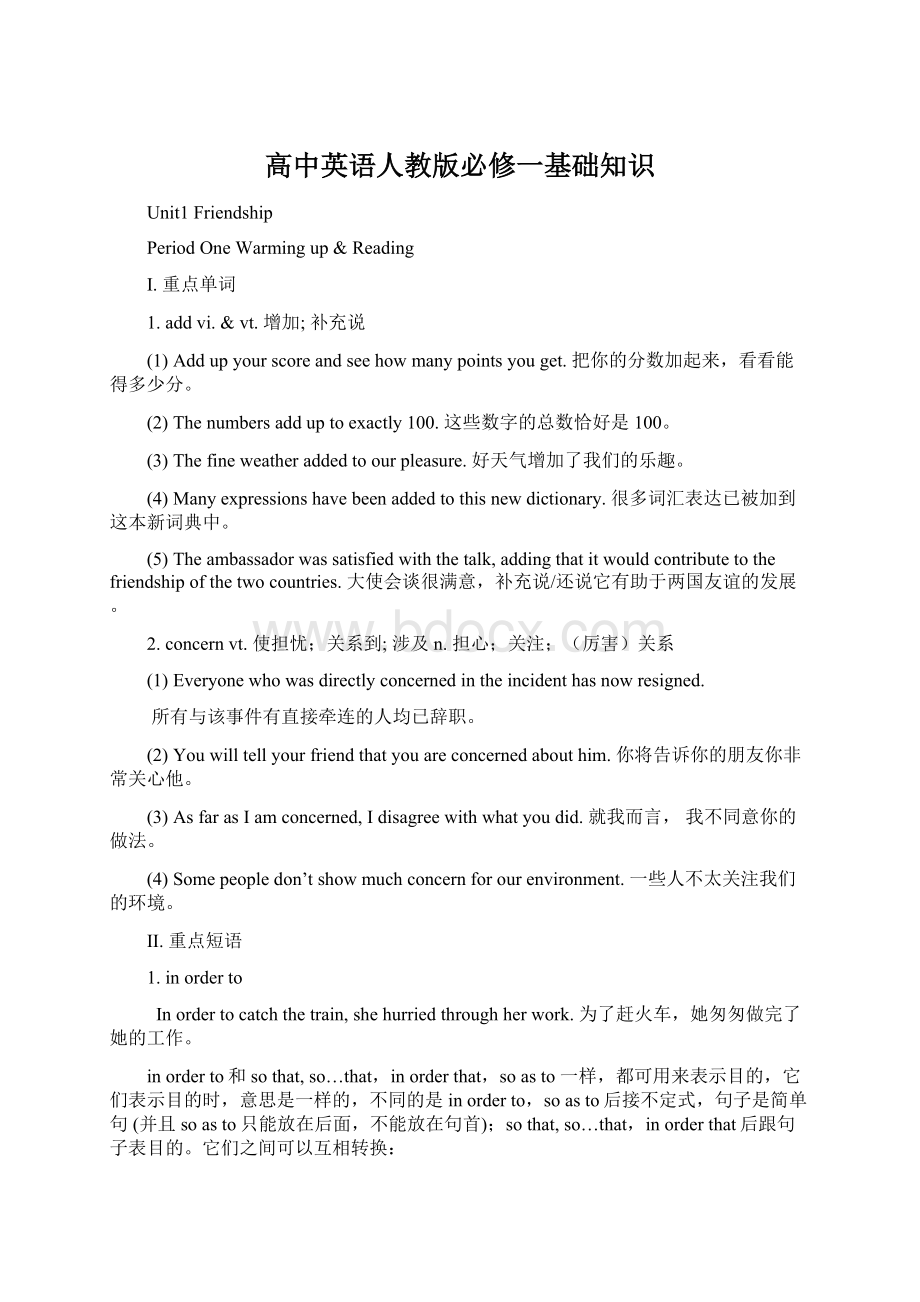高中英语人教版必修一基础知识.docx
《高中英语人教版必修一基础知识.docx》由会员分享,可在线阅读,更多相关《高中英语人教版必修一基础知识.docx(23页珍藏版)》请在冰豆网上搜索。

高中英语人教版必修一基础知识
Unit1Friendship
PeriodOneWarmingup&Reading
I.重点单词
1.addvi.&vt.增加;补充说
(1)Addupyourscoreandseehowmanypointsyouget.把你的分数加起来,看看能得多少分。
(2)Thenumbersadduptoexactly100.这些数字的总数恰好是100。
(3)Thefineweatheraddedtoourpleasure.好天气增加了我们的乐趣。
(4)Manyexpressionshavebeenaddedtothisnewdictionary.很多词汇表达已被加到这本新词典中。
(5)Theambassadorwassatisfiedwiththetalk,addingthatitwouldcontributetothefriendshipofthetwocountries.大使会谈很满意,补充说/还说它有助于两国友谊的发展。
2.concernvt.使担忧;关系到;涉及n.担心;关注;(厉害)关系
(1)Everyonewhowasdirectlyconcernedintheincidenthasnowresigned.
所有与该事件有直接牵连的人均已辞职。
(2)Youwilltellyourfriendthatyouareconcernedabouthim.你将告诉你的朋友你非常关心他。
(3)AsfarasIamconcerned,Idisagreewithwhatyoudid.就我而言,我不同意你的做法。
(4)Somepeopledon’tshowmuchconcernforourenvironment.一些人不太关注我们的环境。
II.重点短语
1.inorderto
Inordertocatchthetrain,shehurriedthroughherwork.为了赶火车,她匆匆做完了她的工作。
inorderto和sothat,so…that,inorderthat,soasto一样,都可用来表示目的,它们表示目的时,意思是一样的,不同的是inorderto,soasto后接不定式,句子是简单句(并且soasto只能放在后面,不能放在句首);sothat,so…that,inorderthat后跟句子表目的。
它们之间可以互相转换:
Sheraisedhervoiceloudinorderthat/sothatshemightbeheard.=Sheraisedhervoicesoloudthatshemightbeheard.
2.gothrough经历,经受;做完;穿过
(1)Thesecountrieshavegonethroughtoomanywarsandtheirpeoplehavegonethroughalotofhardships.这些国家饱经战火,他们的人民经力了很多苦难。
(2)Let'sgothroughtheexercises.咱们把这些练习做完。
(3)Therivergoesthroughthecity,acrossthefieldandfindsitswaytothesea.这条小河穿过这个城市,穿过田野并流入了大海。
III.重点句型
1.Yourfriendcomestoschoolveryupset.
【分析】upset作主语补足语,用来补充形容主语yourfriend来学校时的心情。
类似例句:
⑴Wereachedourschoolat8o’clockintheevening,exhaustedandhungry.
我们晚上八点到学校,又累又饿。
⑵Thegirlwasfoundsittingbythedoorthenextday,deadwithasmileontheface.
第二天女孩被发现坐在门边,死了,脸上带着微笑。
2.Whilewalkingthedog,youwerecarelessanditgotlooseandwashitbyacar.
【分析】省略句,whilewalking…相当于whileyouwerewalking…当时间或条件状语等从句中的主语痛主句主语一致或主语是it,且从句含有动词be时,可以省略状语从句中的主语与动词be。
(1)Themanwaslyingontheground,asif(hewas)seriouslyinjured.
那名男子躺在地上,好像是受了重伤。
(2)If(itis)necessary,youshouldturntoyourparentsforhelp.
如果有必要,你应该向你的父母求助。
3.It/This/Thatis/wasthe+first/second/thirdtimethatsb.haddone…
(注意主句和从句中的时态)
(1)ItisthefirsttimeinayearandahalfthatI’vseenthenightfacetoface.
(2)Itwasthethirdtime(that)hehadfalleninlovethatyear.这是他那一年第三次谈恋爱了。
(3)Thiswillbethethirdtime(that)IhavebeentotheGreatWall.这将是我第三次到长城。
【拓展】
①Itis(high)timeformetogohome.=Itis(high)timethatIshouldgo/wenthome.我该回家了。
②Therewasatimewhenwehadnothingtoeat.有一段时间我们没东西吃。
③IthoughtherhonestthefirsttimeImether.第一次见她时,我认为她很诚实。
④BythetimethisletterreachesyouIwillhaveleftthecountry.
你收到这封信时,我将已经离开了这个国家。
4.强调句型
(1)Iwonderifit’sbecauseIhaven’tbeenabletobeoutdoorsforsolongthatI’vegrownsocrazyabouteverythingtodowithnature.
(2)notuntil强调句型
Itwasnotuntilhesufferedfromillnessthatherealizedtheimportanceofhealth.
(3)Notuntilhesufferedfromillnessdidherealizetheimportanceofhealth.
notuntil置于句首部分倒装
5.Sheandherfamilyhidaway(=hadhidden)fornearlytwenty-fivemonthsbeforetheywerediscovered.
beforeconj.用以表示从句动作发生之前的时间。
⑴强调从句动作发生在主句之前,意为“不等……就……”。
HeaskedasecondquestionbeforeIcouldanswerthefirstone.
⑵“趁着……”或“过了……才……”。
Youwillhave3yearstostudybeforeyoutakethecollegeentranceexamination.
ImustwriteitdownbeforeIforgetit.
⑶It+be+时间段+before从句,意为“……之后才……”。
Itwillbe3yearsbeforehetakesthecollegeentranceexamination.
⑷It+be+not+long+before从句,意为“……不久就……”。
Itwillnotbelongbeforeyoutakethecollegeentranceexamination.
PeriodTwoLearningaboutLanguage&UsingLanguage
I.重点单词
1.settlevt.&vi.定居;使定居vt.使平静,使安静,使镇静;决定,确定;解决
(1)Wearesettledinournewhome.我们住入新居。
(2)Theinsectsettledonaleaf.一只昆虫落在一片树叶上。
(3)Waituntiltheexcitementhassettleddown.等到兴奋的情绪镇静下来再说。
(4)Wehavesettledwhowillpayforthemeal.我们已经定了由谁来付饭钱。
(5)Imustsettleallmyaffairsbeforeleaving.我必须在离开之前把一切事情安顿好。
(6)Ifyouwatchlongenough,youwillseemanyproblemssettledbythismeans.如果你观察的时间足够长的话,你会看到许多问题被通过这种方式解决。
2.suffervt&vi遭受;忍受;经历
(1)Shesufferedfromloneliness,butshehadtolearntolikeitthere.她忍受孤独,但不得不学习喜欢这儿。
(2)Thearmysufferedheavylossesinthebattle.这支军队在战斗中伤亡惨重。
3.disagreevi不同意
Hedisagreedwithhisparentson/about/overmanythings.他与父母意见不一致。
II.重点短语
1.get/betiredof…厌倦/讨厌;get/betiredfrom…因…而劳累
(1)Ihavegottiredoflookingatnaturethroughdirtycurtainsanddustywindows.
我讨厌透过脏兮兮的窗帘和沾满灰尘的窗户观看大自然。
(2)Youmustbeverytiredfromdoingtheexperimentsoneafteranother.
一个接一个得做实验,你肯定很累了。
3.getalongwith与…相处;进展
(1)I’mgettingalongwell/nicelywithaboyinmyclass.我与班上的一个男孩处得很好。
(2)Myworkisgettingonwell/smoothly.我的工作进展很顺利。
4.join…(in)…参加
Willyoualljoin(us)insingingthesong,please?
你们都愿意跟我们一起唱这首歌吗?
【拓展】“参加”的异同:
①join多指参加某组织、党派或社会团体,成为其中一员:
HejoinedthePartyin1986.他1986年入党。
②“takepartin…”;“participatein…”指参加某一活动或赛事;并在其中起一定作用
Ourstudentstakepartinmanyafter-classactivities.我们的学生参加很多课外活动。
③attend指“出席”参加某一会议、课程或典礼等。
Weattendedtheprofessor’slectureandlearnedalot.我们参加这名教授的并学了了很多。
PeriodThreeGrammar直接引语和间接引语
引述别人的话时,一般采用两种方式:
一是引用别人的原话,把它放在引号内,称为直接引语;二是用自己的话加以转述,被转述的话不放在引号内,称为间接引语。
间接引语在大多数情况下是一个宾语从语。
直接引语变成间接引语时,要注意以下几点:
人称变化、时态变化、宾语从句要用陈述句语序。
1.直接引语是陈述句,变成间接引语时,由连词that引导。
例如:
Shesaid,"Iamveryhappytohelpyou."→
Shesaidthatshewasveryhappytohelpyou.
2.直接引语是一般(选择/反意)疑问句,变成间接引语时,由连词whether或if引导。
例如:
Heaskedme,"Doyoulikeplayingfootball?
"→
Heaskedmeif/whetherIlikedplayingfootball.
注意:
大多数情况下,if和whether可以互换,但后有ornot,或在动词不定式前,或放在介词后作连接词时,一般只用whether。
例如:
Sheaskedmewhetherhecoulddoitornot.
Hehesitatedaboutwhethertodriveortakethetrain.
3.直接引语是特殊疑问句,变成间接引语时,由相应的疑问词who,whom,whose,how,when,why,where等引导。
例如:
Mysisteraskedme,"Howdoyoulikethefilm?
"→
MysisteraskedmehowIlikedthefilm.
Unit2EnglisharoundtheWorld
PeriodoneWarmingup&Reading
I.重点单词:
1.basevt以…为根据n.basis基础
(1)Whatareyoubasingthistheoryon?
你这种理论的根据是什么?
→Thistheoryisbasedonwhatweallknow.这个理论建立在我们已知知识的基础上。
(2)Shewaschosenforthejobonthebasisofherideas.她因想法对路而被选担任该工作。
【分词考查】Basedon(=Dependingon)myexperiencesinpoverty-strickenareas,Isuggestedthatwhiletheemotionswehadwerepainful,theycouldalsobeimportantinhelpingustomoveforward.
鉴于我在贫困地区的经历,我提议说尽管我们的情感是痛苦的,但它们很重要,帮我们前行。
II.重点短语
1.becauseof因为;由于
He'scalled“Ginger”becauseofhisbrightgingerhair.
他长着一头淡黄色的头发,因而被人叫着“黄毛”。
Heeatsbecauseofgreed,nothunger.
他不是因为饿了,而是因为贪嘴才吃的。
【拓展】because后面跟一个句子,是来回答why问题,或者解释原因的;而becauseof后面直接跟一个名词、代词、动名词或者短语,它和后面的词或词组构成一个原因状语。
Becauseitisrainingoutside,Icannotgooutrightnow. =Becauseoftherain,Icannotgooutrightnow.
2.comeup走进;上来;提出
(1)Hecameupandaskedmehowtogotothebusstop.他走上前问我怎样去公共汽车站。
(2)Wouldyoupleasecomeuptomyflatforavisit?
你想来我的公寓参观一下吗?
(3)Yourquestioncameupatthemeeting.你的问题在会上给提出来了。
(4)Shecameupwithanewideaforincreasingsales.她想出了增加销售量的新主意。
归纳总结:
comeup1)走近上来;2)上升3)(太阳月亮)升起;4)长出,发芽;5)被提出
3.atpresent
(1)Atpresent,heisonholiday.目前,他正在度假。
(2)Idon'tneedthepapersatpresent.Thankyouverymuchallthesame.
我现在还不需要这些文献,但我还是要感谢你。
4.makeuseof
make(good/better/thebest)useof利用
(1)Youshouldmake(full)useofyoursparetimetodosomethinguseful.你应该充分利用你的业余时间做一些有用的事。
(2)Youwon’tgetanotherchance----makethemostuseofit!
你不会有另外一次机会—好好把握它啊!
(3)Weshouldmakegooduseoftime.我们应该好好地利用时间。
5.suchas
suchas例如(用来列举事实,不是全列出来)
(1)Fattyfoodsuchaschipsarebadforyou.高脂肪食物如炸土豆条对你没有益处。
一些象钢、铁、废纸等都可以回收利用。
(2)Somerubbishsuchassteel,iron,wastepapercanallberecycled.一些象钢、铁、废纸等都可以回收利用。
III.重点句型
1.NativeEnglishspeakerscanunderstandeachotherevenif(=eventhough)theydon’tspeakthesamekindofEnglish.
辨析意思:
even;asif/asthough
2.ItwasbasedmoreonGermanthantheEnglishwespeakatpresent.
3.Forexample,IndiahasaverylargenumberoffluentEnglishspeakersbecauseBritainruledIndiafrom1765to1947.
PeriodTwoLearningaboutLanguage&Usinglanguage
I.重点单词
mandn&vt命令;指令;掌握
(1)Thegeneralcommandedhissoldierstoattackthecity.将军下令攻城。
(2)Hecommandedthatsuchthings(should)bepreventedfromhappeningagain.
n.HehasagoodcommandoftheFrenchlanguage.他精通法语.【联系】haveagoodknowledgeof..
2.requestvt请求,恳求
(1)Irequestedhimtohelpme.
(2)Herequestedthattheletter(should)bedestroyed.他恳求把这封信毁掉。
3.recognizevt辨认出(某人的面貌;声音;书法等);承认;公认
(1)Irecognizedhimassoonashecameintheroom.他一进屋我就认出了他。
(2)Thebookisnowrecognizedasaclassic.这本书现在是一部公认的经典著作。
II.重点短语
1.playapartin(在…中)起作用;扮演某个角色
Heplayedaleadingpartinthemovement.他在那次运动中起了重要作用。
Heplayedtheleadingpartinthefilm.他在这部电影中扮演主角。
III.重点句型
1.Believeitornot,thereisnosuchthingasstandardEnglish.
(1)believeitornot信不信由你
Believeitornot,theexaminationtomorrowiscancelled.
信不信由你,明天的考试取消了。
(2)nosuch没有这样的/类的
当such与no/other/many/some等同时修饰名词时,应该no/other/many/some在前,such在后。
Thereisnosuchstudentinourclass.我们班上没有一个这样的学生。
PeriodThreeGrammar直接引语和间接引语
1.直接引语是祈使句,变成间接引语时,把动词原形变成动词不定式,并在动词不定前加tell,ask,order等的宾语。
例如:
Thecaptainordered,"Bequiet."→
Thecaptainorderedustobequiet.
注意:
此种情况的否定句,在动词不定式前加not。
Myteacheraskedme,"Don'tlaugh."→
Myteacheraskedmenottola